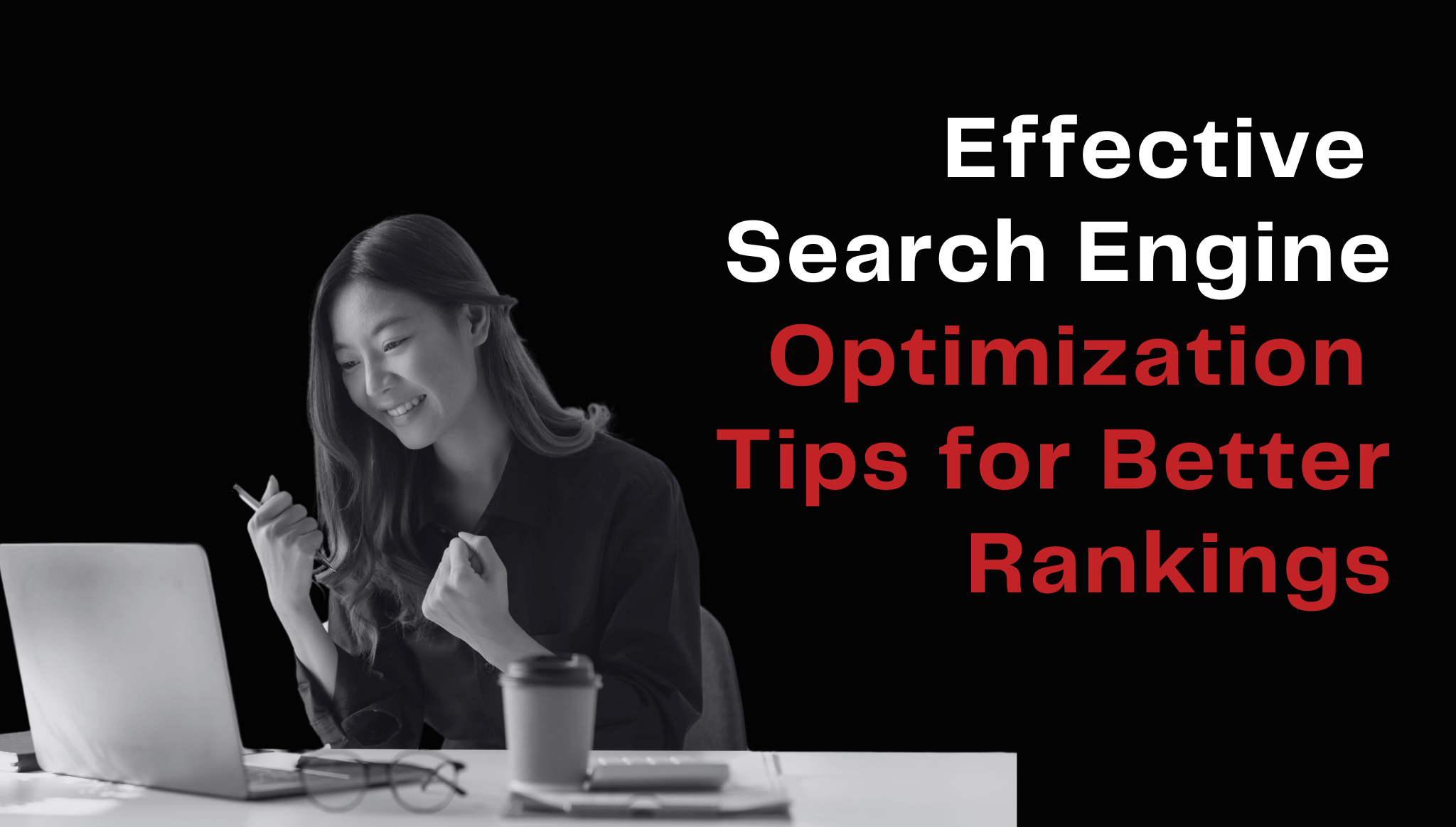Maximize Your Reach: Proven Strategies for Effective Search Engine Optimization

In today’s digital world, having a strong online presence is more important than ever. Whether you’re a small business owner or a large corporation, understanding how to use Search engine optimization effectively is key to improving your visibility on the web. If you’re looking to attract more visitors to your website, drive higher sales, or just grow your brand, optimizing for search engines is a must. But don’t worry if SEO sounds complicated — in this blog, I’ll break down the most effective SEO strategies in simple terms so you can start improving your website’s performance right away.
What Is SEO?
Search engine optimization refers to the process of enhancing your website so that search engines like Google can understand and rank it better. When someone types in a search query, Google uses its algorithm to decide which pages are most relevant. By optimizing your website for these search engines, you increase the chances of ranking higher, thus improving your website’s visibility.
For example, when someone types “best pizza near me” into Google, you want your pizzeria’s website to appear at the top of the search results. This can only happen if your website is properly optimized.
Why SEO Matters
If your business has a website, SEO is essential because it helps you stand out from the competition. Without effective SEO, you could be missing out on the opportunity to attract organic traffic. This means people finding your website naturally, without you having to pay for ads. When you optimize your website, you’re essentially telling Google what your site is about and why it’s worth ranking higher.
Even if you’re offering fantastic products or services, if people can’t find your website, you won’t be able to grow. SEO is what makes your website discoverable to the right audience. Think of it like setting up a digital signpost to guide people to your business.
Proven Strategies for Effective Search Engine Optimization
Now that we’ve covered the basics, let’s dive into proven strategies you can use to improve your Search Engine Optimization.
1 . Keyword Research: The Foundation of SEO
One of the first steps in SEO is choosing the right keywords. Keywords are the terms or phrases that people type into search engines. When you use these keywords strategically on your website, you increase your chances of ranking higher for those terms.
To start, think about what your audience is likely to search for. Use tools like Google Keyword Planner or SEMrush to find out what people are searching for in your industry. Once you have a list of keywords, you’ll want to naturally incorporate them into your website content.
2 . On-Page SEO: Optimizing Your Website
Once you’ve identified your target keywords, it’s time to implement them on your website. This is where on-page SEO service comes in. On-page SEO refers to optimizing individual pages on your website to make them more attractive to search engines.
Title Tags and Meta Descriptions
Each page on your website should have a unique title tag and meta description. The title tag is the title that appears in search engine results, and the meta description is the short description underneath it. Both should include your main keyword for the page.
For example, if you’re a digital marketing agency, your title might be “Top Search Engine Optimization Services for Businesses.” This helps both Google and potential visitors understand what your page is about.
Content Optimization
Your website content is where you’ll use your keywords. But remember, the key to good content is quality, not quantity. Instead of stuffing keywords into every paragraph, make sure your content is informative, easy to read, and helpful to your audience. Using the keywords naturally throughout your content is important for SEO.
3 . Technical SEO: Ensuring Your Website Is Easy to Crawl
Technical SEO involves the backend of your website — making sure that it’s easy for search engines to crawl and index your pages. Even the best content will be ineffective if Google can’t access it.
Mobile-Friendliness
More people are browsing the internet from mobile devices than ever before. That means your website needs to be mobile-friendly. Google uses mobile-friendliness as a ranking factor, so if your site isn’t optimized for mobile, you’re likely to miss out on potential visitors.
Fast Loading Speed
Page speed is another important factor in SEO. If your website takes too long to load, visitors will leave before it even finishes. This increases your bounce rate and negatively affects your ranking. Tools like Google Page Speed Insights can help you identify ways to improve your page speed.
Secure Website (HTTPS)
Having a secure website is no longer optional. Google prefers websites that use HTTPS because they are more secure for users. If your website still uses HTTP, it’s time to make the switch to HTTPS. It will not only improve your SEO, but also build trust with your visitors.
4 . Content Marketing: Keep Your Audience Engaged
Great content is one of the most powerful SEO strategies. When you provide valuable, informative content that solves problems for your audience, you increase your chances of ranking higher.
Blogging
A great way to keep your audience engaged is through blogging. By writing informative articles related to your business, you can target long-tail keywords — specific phrases that are less competitive but still relevant to your audience. Regularly publishing blogs shows Google that your site is active, which can boost your SEO.
Video Content
Another effective content strategy is video. Videos are highly engaging and tend to rank well on search engines. If you have the resources, consider creating educational videos or how-to guides related to your business. These can help increase both your SEO and user engagement.
5 . Off-Page SEO: Building Your Website’s Authority
Off-page SEO involves activities that help build your website’s reputation and authority outside of your own site. The most important factor in off-page SEO is backlinks — links from other websites that point to your site. When high-quality websites link to your content, it signals to search engines that your website is trustworthy and authoritative.
Guest Blogging
One way to get backlinks is through guest blogging. This involves writing articles for other websites in your industry and including a link back to your site. Guest blogging not only helps you build backlinks but also gives you the opportunity to reach a wider audience.
Social Media Sharing
Social media can also help with off-page SEO. When you share your content on platforms like Facebook, Twitter, and LinkedIn, you increase the likelihood that others will link to your site. This can drive more traffic and improve your SEO.
The Role of SEO Services in Maximizing Your Reach
If SEO feels overwhelming, or if you don’t have the time to implement all these strategies, you can always turn to professional SEO services. SEO experts are skilled in optimizing websites, and they can take your SEO efforts to the next level. Whether you need help with keyword research, on-page optimization, or building backlinks, SEO services can make the process much easier and more effective.
Tracking and Measuring Your SEO Success
One of the most important aspects of SEO is tracking your progress. SEO is not a one-time task — it’s an ongoing process. Use tools like Google Analytics and Google Search Console to monitor your website’s performance. These tools will show you how much traffic you’re getting, which keywords are driving the most visitors, and how your rankings are improving.
Key Metrics to Track
- Organic traffic: How many visitors are coming from search engines?
- Bounce rate: How many visitors leave your site after viewing just one page?
- Keyword rankings: How well are your target keywords ranking on search engines?
- Backlinks: How many high-quality backlinks are pointing to your site?
By regularly checking these metrics, you can adjust your strategies to improve your SEO efforts.
Boost Your Website Ranking Now!
Effective SEO isn’t something that happens overnight, but with consistent effort, you can significantly improve your website’s visibility and drive more organic traffic. Whether you handle SEO yourself or hire professional SEO services, the key is to stay focused on providing value to your audience, using the right keywords, and ensuring that your website is technically sound.
If you’re ready to take your website’s performance to the next level and maximize your reach, don’t hesitate to reach out to an expert in SEO. Get started today, and watch your online presence grow! Contact us for tailored SEO services to boost your rankings and bring more traffic to your website.
FAQs
SEO is the process of improving your website so that search engines like Google can better understand, rank, and display it in search results. It’s important because it helps increase your website’s visibility, driving organic traffic that can lead to more customers and business growth.
SEO is a long-term strategy, and it usually takes a few months to start seeing noticeable results. Factors like the competitiveness of your industry, the quality of your content, and the consistency of your efforts all influence how quickly you can see improvements.
Yes, you can do SEO yourself, but it can be time-consuming and requires a good understanding of the process. If you’re new to SEO, starting with basic strategies like keyword research, content optimization, and technical fixes can help you get started. However, hiring professionals for complex tasks can be a wise choice.
Even if your website is optimized, SEO is an ongoing process. Search engine algorithms evolve, and so do user preferences. SEO services can help keep your website up-to-date with the latest trends and practices, ensuring that your rankings stay strong and you maintain a competitive edge
To improve your website’s SEO, focus on optimizing your on-page content with relevant keywords, ensuring your site is technically sound (mobile-friendly, fast-loading, secure), and building backlinks from authoritative sites. Regularly update your content to keep it fresh and engaging for visitors.
For small businesses, focusing on local SEO, optimizing your Google My Business profile, using long-tail keywords, and creating high-quality content are essential strategies. Leveraging SEO services can also help small businesses achieve better results with less effort and time investment.





